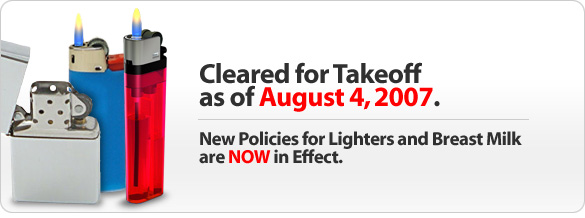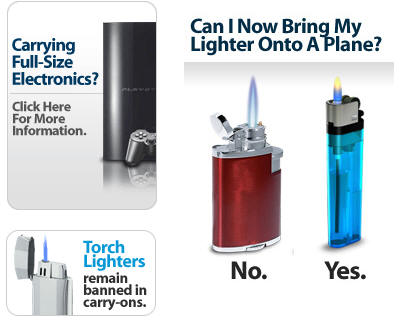


The U.S. is the only country in the world to ban lighters – all other nations, including Israel and the U.K., do not. When dealing with security issues, threats evolve. In aviation, terrorists hijacking and diverting planes was the threat for decades. On 9/11, aircraft were used as weapons, and recent plots have included liquid explosives. Below is a timeline of the evolution of the lighter ban.
December 21, 2001 - Richard Reid made a failed attempt to detonate an improvised explosive device in his shoe onboard a Paris to Miami flight. His shoe-bomb device malfunctioned and he was overpowered by cabin crew and passengers. He was using matches as an ignition source. In an effort to address this threat, TSA soon required travelers to remove their shoes for security screening.
December 17, 2004 – The President signs into law the Intelligence Reform and Terrorism Prevention Act of 2004 which, among other measures, requires TSA to add "butane lighters" to its prohibited items list. (Torch lighters have long been prohibited for hazmat reasons.) March 31, 2005 – TSA recognizes Congressional intent and adds all common lighters to the prohibited items List. The United States becomes the only nation in the world to prohibit lighters from carry-on luggage.
April, 2005 – Lighters immediately become the number one prohibited item surrendered at checkpoints across the country – at times, almost 39,000 a day. October 4, 2006 -- Congress passes the Department of Homeland Security Appropriations Act which gives the TSA administrator the discretion NOT to enforce the lighter ban. August 4, 2007 -- Common lighters are no longer banned from carry-ons.
Lighter Timeline
Frequently Asked Questions
In an effort to concentrate resources on detecting explosive threats, TSA will no longer ban common lighters in carry-on luggage as of August 4, 2007. Torch lighters remain banned in carry-ons. Lifting the lighter ban is consistent with TSA's risk-based approach to aviation security.
First and foremost, lighters no longer pose a significant threat. Freeing security officers up from fishing for 22,000 lighters every day (the current number surrendered daily across the country) enables them to focus more on finding explosives, using behavior recognition, conducting random screening procedures and other measures that increase complexity in the system, deterring terrorists.
Q. Are lighters not a threat
anymore?
A. Lighters are not a serious threat. Lifting the ban is a common sense,
risk-based security decision. This change allows officers to focus on
finding explosives and IED components. TSA collects 22,000 lighters a day.
Q: Why were all lighters
banned as carry-on items in the first place?
A. In April of 2005, TSA began enforcing a Congressional mandate to ban
common lighters on the secure side of airports or onboard airplanes.
Q. What is a torch lighter?
A. Torch lighters create a thin, needle-like flame that is hotter (reaching
2,500 degrees Fahrenheit) and more intense than those from common lighters.
Torch lighters are often used for pipes and cigars, and maintain a
consistent stream of air-propelled fire regardless of the angle at which it
is held. Torch lighters continue to be banned.
Q. Does your lighter need to
be in a baggie since it contains liquid?
A. No. TSA's common-sense approach harmonizes with worldwide standards for
lighters.
Q. Why is breast milk not a
threat?
A. Breast milk is a medical necessity and it is being classified as such. It
must be declared at the checkpoint.
Q. How do you ensure liquid
explosives disguised as breast milk or medications are not brought through
the checkpoint?
A. Since September 2006, certain liquid medications have been permitted at
the checkpoint as long as they are declared to security officers and are
subject to additional screening.
Q. Do passengers carrying
breast milk need to taste it to prove it is not a liquid explosive?
A. No. We will not ask a traveler to taste breast milk.
Q. What does "additional
inspection" of exempt items include?
A. We don't discuss our specific security procedures. Since the liquid ban,
passengers have been required to present exempt liquids at the checkpoint to
undergo additional scrutiny.